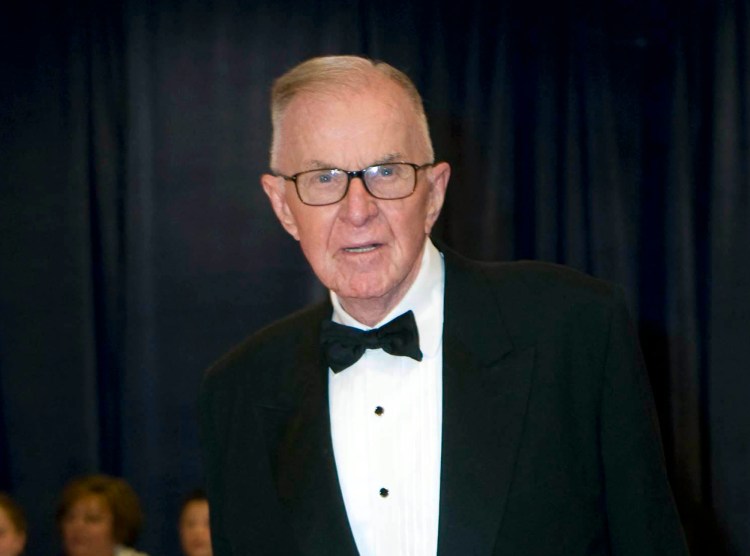John McLaughlin, a former Jesuit priest, speechwriter for President Richard Nixon and conservative provocateur whose pugnacious style as a host of a political chat show helped usher in the era of impolite punditry, died Tuesday at his home in Washington. He was 89.
The cause was complications from prostate cancer, said journalist Eleanor Clift, one of his on-air sparring partners. McLaughlin missed the most recent installment of his syndicated public affairs program, “The McLaughlin Group.”
Before entering the world of politics, McLaughlin was a Jesuit teacher in the 1950s at Cheverus High School in Portland.
For more than three decades, McLaughlin sat in judgment of national political trends on “The McLaughlin Group” and goaded journalists and pundits into moving beyond fact into the argumentative terrain of ideological talking points and rhetorical hyperbole. He corralled guests into critiquing political decisions and probabilities on a sliding scale of 1 to 10 – with 10 representing “metaphysical certitude.”
At times, “The McLaughlin Group” felt more like a cross-talk show than a talk show, with the host interrupting his guests’ trains of thought or bellowing “Wronnng!” to express disapproval of their statements.
His approach forever changed audience expectations of public affairs programming. McLaughlin’s impact can be glimpsed most any night on cable news channels, for better or worse. And though no one ever mistook McLaughlin for a digital visionary, his show’s staccato approach to wringing opinions from guests previewed the internet’s addiction to fast and unprocessed news bites.
“Look at ‘The McLaughlin Group’ now, and it looks positively quaint,” said Syracuse University television historian Robert Thompson. “The kind of thing McLaughlin was doing is being done in so many places.”
Although “The McLaughlin Group” dominated his later life, McLaughlin had a three-act career that started in the priesthood. He worked his way into politics, running unsuccessfully for a U.S. Senate seat in 1970 and later landing a job in the Nixon White House. As a speechwriter for the president and one of his fiercest defenders through the Watergate scandal, McLaughlin attracted media attention upon which he capitalized to get into television.
When “The McLaughlin Group” launched in 1982 on WRC in Washington, political chat shows were unrecognizable by modern standards. “Washington Week in Review,” produced by the public television outlet WETA, was a cerebral and quiet product. McLaughlin saw an opening in the market for TV blather.
“Energy, tempo and bonhomie,” he said, were a few of the vital ingredients he sought to infuse in the program, along with “first-rate reporting and straight opinion.”
His best-known guests – then-Newsweek writer Clift, the late Baltimore Sun columnist Jack Germond, conservative commentator Patrick Buchanan and Washington-based journalist and editor Morton Kondracke – often shouted over each other to present their opinions.
While McLaughlin was seated at the center of his show’s set, his politics favored the right.
“The McLaughlin Group” lost relevance in more recent years, in part because of the emergence of the Fox News Channel – which launched in 1996.
McLaughlin’s bombastic style was memorably parodied by comedian Dana Carvey on “Saturday Night Live.” And some of McLaughlin’s colleagues contended that the tyrannical fellow who viewers saw on “The McLaughlin Group” was really no act.
A female office manager who worked for the host filed a sexual harassment suit against him that was settled out of court in 1989. Kara Swisher, a McLaughlin staffer who later rose to prominence at the Wall Street Journal, was once ordered by McLaughlin to make toast. After she balked at the command, he told her, “If I ask you to make toast and you don’t do it, I can fire you.”
McLaughlin was born in Providence, Rhode Island, on March 29, 1927. He described his parents, of Irish descent, as “rootedly Democratic.” His father was a furniture salesman.
The young McLaughlin attended LaSalle Academy, a Christian Brothers school in Providence. It was in these formative years that he built his reverence for the Jesuit religious order, telling the New York Times that it had “a gallantry, an intellectual adventurism, a style, a panache.”
He began his training for the priesthood at Weston College in Massachusetts. He later received a bachelor’s degree from Boston College, where he also earned master’s degrees in philosophy and education.
He broke with his family heritage by registering as a Republican in advance of his candidacy in the 1970 U.S. Senate race in Rhode Island. McLaughlin took aim at Democratic incumbent John Pastore by running unsuccessfully as a “peace” candidate during the Vietnam War. McLaughlin parlayed his loss at the polls into a professional win – an appointment as a speechwriter in the Nixon White House.
He married Ann Lauenstein Dore in 1975 after petitioning Pope Paul VI for laicization, relieving him of any priestly obligations. Their marriage ended in divorce in 1992.
His second marriage, to Cristina Vidal, also ended in divorce. He had no immediate survivors.
Send questions/comments to the editors.



Comments are no longer available on this story